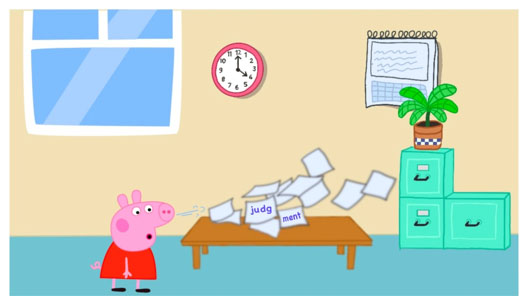It Ain’t Over Till the Fat Lady Sings
27 June 2022We repeated that, every time that we came across articles sympathizing with the poor Peppa Pig hurt by a judge in her emotional outburst. Indeed the judgment dismissing the claim of trademark and copyright infringement is strange, to say the least. It does not comply with any provisions of the law. However it does not deserve the world attention it received. The implication behind those articles is to support the allegation that Russian intellectual property is not protected any longer. Even days before the appeal court examined the case, several articles were run by different sources with a statement that such attitude is characteristic of Russian courts in general, while this case stands out among many other Peppa’s cases where the rights owner prevailed.
The exception does not prove the rule. To establish a consistent pattern many experiments have to be made in science. The same should be in the legal sector. It is unfortunate that authors of articles raising the issue of Peppa Pig extend one particular case to all intellectual property in Russia.
Before and after that notorious case Peppa’s right owner sued infringers a thousand times, won compensation and this went off unnoticed being too routine. In one of the winning cases the judge said that allegiance of a company to an unfriendly country does not mean that the company from that country takes unfriendly actions contradicting international law.
 It is unfortunate that this unhappy case undeservingly came in the limelight of public attention. None of the writers noted that the judgment did not come in force and very few people noticed that the judgment had been appealed and continued shedding tears over poor Peppa.
It is unfortunate that this unhappy case undeservingly came in the limelight of public attention. None of the writers noted that the judgment did not come in force and very few people noticed that the judgment had been appealed and continued shedding tears over poor Peppa.
It is unfortunate that authors of articles describing the Peppa case extrapolated the situation to intellectual property in general and did not wait until examination of the case was over. With her nose looking like a hair drying machine it now blew off the previous unlawful judgment and put to shame impatient authors.
Peppa case was to be re-examined by appeal court on June 14th however the hearing was put off to June 21 for technical reasons. The delay did not affect the substance of the judgment: the court cancelled the judgment in full and ruled to issue a new judgment. Often, the court of appeal sends the judgment down to a lower court. In this case, the court decided to issue the judgment itself. The new judgment awarded compensation to the plaintiff for two trademarks and for two visual works of art. In all, 25 000 rubles. Not much, but the plaintiff won hundreds of similar suits so that the overall sums of money are impressive. To add insult to injury the court also recovered the court fees from the infringer in the amount 5,000 rubles and additionally 50 rubles of postal expenses (less than the cost of a subway ticket) to give the infringer a virtual slap in the face.
The above case is not the only case of a far-fetched connection of intellectual property to unfriendly country. Late in May, 2022, the IP court examined a case of non-use of a trademark. An individual entrepreneur initiated a non-use court action against The Italian Sea Group S.p.A. regarding trademark No706503.

The plaintiff argued that he wanted to use the designation for marking small boats. He sent a proposal for assignment to the trademark owner within the framework of the prejudicial procedure, however the proposal was rejected. That proposal is a must before initiating a court action.
The plaintiff explained his interest in the cancellation of the trademark by the fact that he owns a domain name “admiralspb.com". He also builds boats and filed a trademark application No2021707882 for the designation ![]() . He is the only founder and director of ADMIRAL LLC.
. He is the only founder and director of ADMIRAL LLC.
The court analyzed differences before the trademark of the respondent and the plaintiff and found similarities as well as differences.
To enhance his position the plaintiff entrepreneur asked the court to satisfy his claims in full because the owner of the disputed trademark is an Italian company. Italy is among the countries of the European Union included by Russia in the list of unfriendly countries.
The court rejected that argument because it is based on a wrong interpretation of the procedural right. The fact of inclusion of a country in a list of unfriendly countries does not relieve the plaintiff from the obligation to prove his claims.
As a result, after examining the claims of the plaintiff, the circumstances of use of the trademarks and designations, their differences and similarities the court discontinued protection of the trademark No706573 in respect of the goods in Class 12 only and rejected all other his claims.
Before the above judgments we saw many articles entitled “Has Russia legalized intellectual-property theft?”, “A new law seems to strip away the IP rights of Western firms” (the Economist) and several dozen similar articles that appeared in the media.
It is unfortunate that articles published without deep analysis of facts misled and did a bad service to IP owners.











